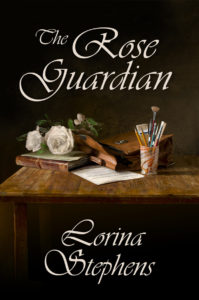Reviewed in Ottawa Review of Books
I am just thrilled to learn my recent novel, The Rose Guardian, has been reviewed by Robert Runté in The Ottawa Review of Books. How amazing is that?
 The full review is here:
The full review is here:
It starts with a funeral.
Una Cotter is dead, and her sixty-something daughter, Vi, is left to sort out her feelings about her mother, her family, her childhood, and her ambiguous inheritance. One cannot but grieve the passing of one’s mother, but when Una Cotter was your mom, it’s complicated.
This is a quiet, thoughtful book that will appeal to anyone working through the loss of a parent or a midlife crisis. Lorina Stephens paints a multi-layered canvas of loss and release, of denial and self-examination, of blame and understanding. The portraiture that emerges as each layer is laid down is a complex and nuanced examination of three generations of women, each the product of their era, but also slightly out of phase. Vi learns much that had been hidden when she inherits Una’s diaries, but it’s Vi’s re-examination of her own childhood that provides the greatest insights into her family’s dynamic and the need to understand and come to terms with her own issues.
There is a lot of food for thought here, and what I liked most about the book was its undercurrent of resigned optimism. Life is what it is, you can’t change the past, you can’t change other people, but you can change your own perceptions and reactions. Looking back, and then letting go of who you were, might just be the best way forward.
Of course, any great book is about more than just the central theme. I loved the multifaceted character of Vi as a competent, compassionate, and creative woman. While those around her are starting to worry she may be losing it, we see that she is just now coming into her own as both an artist and a woman suddenly freed of a weight she has been carrying. I loved the intimate descriptions of the painter at her canvas, both for the technical descriptions and as a central metaphor. I loved the characterization of her relationship with her ex and her uncle, both worthy men. And best of all, I loved her characterization of the ghost (did I mention there’s a ghost?), the mystery child who first appears at the funeral. Stephens gets inside the ghost-child’s head to show us the true magic of childhood—which is to say, often very dark magic, a terrifying world of monsters with only the Rose Guardian between you and chaos. I recognized several of the nightmares from my own childhood, and glimpsed some of my daughter’s still current fears, and if these scenes don’t resonate with you, you must have had an exceptional childhood . . . or a selectively poor memory.
Stephens depicts people coping with their lives and each other as best they can, such that in the end, they are all sympathetically portrayed, even Una. This is the family next door, or down the block, or possibly people you recognize in your own extended family. I’m glad I’ve met them, glad Vi is doing okay . . . and I really like this new direction in Vi’s paintings.